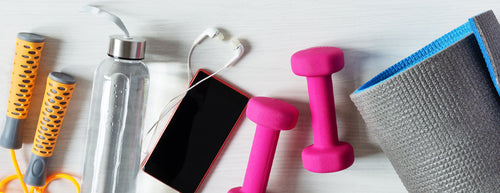We all have different skin types and and as a result, different skin ailments. Some of us are dealing with spots, others unwanted redness while for some red, scaly patches in the form of psoriasis may be an issue. Today we're taking a look at some natural remedies for common skin conditions like Acne, Eczema, Psoriasis and Rosacea to help you get a handle on your skin woes.
Natural Remedies for Common Skin Conditions
1. Natural Remedies for Acne
What is Acne?
Acne is a common skin condition that causes spots and oily skin as a result of blocked pores. With skin often hot or painful to touch, it is common during our teenage years but can persist. The following are some helpful ways of tackling acne without having to resort to antibiotics and harsh, chemical-laden creams:
How to treat acne naturally:
Essential oils
Tea tree and lavender are antiseptic and calming respectively, keeping the skin clean and reducing inflammation.
DIY blemish blaster
Mix bicarbonate of soda and water to form a paste and apply to individual spots. Leave for 10 minutes and rinse with cold water.
Natural Spot Treatment
Rather than use chemical-laden spot treatments, there are natural alternatives that are gentler on your skin. Try Weleda SOS Spot Treatment which uses thyme and natural sulphur.
Lemon juice
The citric acid attacks the bacteria which causes acne. Rub onto skin, leave for five minutes, rinse and apply Aloe Pura Organic Aloe Vera Face Mask
Diet make-over
Cut out refined sugar, dairy, processed foods and simple carbohydrates (white bread, pasta etc.) where possible. Eat more oily fish and vegetables, and drink more water. Swap coffee and tea for cleansing herbal teas.
Supplementation
Take probiotics - the body's defence mechanism. A happy gut can rapidly lead to happy skin! Omega 3 fish oils help to reduce inflammation and balance the skin's natural production of oils.
Helpful herbs
Milk thistle, dandelion and artichoke are great for liver support and cleansing. These three herbs, when taken together, can help to detoxify the liver of excess hormones whose build-up could be contributing to the acne in question. Turmeric is also a high strength natural anti-inflammatory.
Scarring
To avoid scarring of acne spots, make sure not to scratch or pick blemishes. Treat any marks left behind after pimples with oil high in Omega 3, 6 and 9 such as Trilogy Organic Rosehip Seed Oil or Viridian Organic Omega 3:6:9 Oil, to reduce pigmentation and retain the skin's elasticity.
Stress management
Last but not least, whatever you find most effective, be it exercise, yoga, meditation, spending time in nature or listening to music, find what works for you and do it often!
2. Natural Remedies for Eczema
What is eczema?
Eczema is an inflammatory skin disease where the skin becomes red, dry, itchy and scaly. Here are some natural remedies for this common skin condition.
How to treat Eczema naturally:
Topical application
Calendula cream, shea butter, and coconut oil can help to soothe itching and inflammation as well as protecting the skin from external irritants, keeping the area clean, and preventing infection. You could also try a calendula soap as a face wash.
Loose and comfortable clothing
Fabrics like wool and polyester should be avoided and cotton or silk chosen instead.
Switch to natural
Switch to natural beauty products such as shampoos, conditioners, shower gels and body moisturisers, avoiding nasties like sodium laurel sulphate where possible.
Taking shorter and less frequent showers
Shorter showers (and less frequent!) can help to avoid stripping the skin of its natural oils and drying it out further. Always moisturise after showering, using coconut oil or a natural, sensitive body moisturiser.
Diet
Focus on foods that promote gut and liver health, raw foods and foods high in good fats (omegas) such as oily fish, seeds, nuts and avocados. Dairy products are one of the most common dietary triggers of eczema, so foods like milk, yoghurt and cheese need to be eliminated from the diet too. Here are some great alternatives to milk.
Fish oil
Omega 3 not only has strong anti-inflammatory properties, but also acts like an internal moisturiser, lubricating the skin from the inside out.
Vitamins A, D and E:
When taken together, these three vitamins help to boost collagen production, improve skin texture and retain hydration.
Probiotics
Probiotics feed the immune system and encourage it to defend the body more effectively.
Milk thistle, dandelion and artichoke
These herbs not only support healthy liver function, but also encourage detoxification. Everything we come into contact with gets processed in the liver. Cleaning it out can rid the body of excess hormones and toxins left behind by allergens and irritants; thus reducing signs of irritation on the skin's surface.
3. Natural Remedies for Psoriasis
What is Psoriasis?
Psoriasis is chronic auto-immune disease. It causes red, itchy patches with silvery scales, most commonly on the joints like knees and elbows but can appear anywhere. It happens when skin cells build up and shed at an accelerated pace. Although there is no known cure for psoriasis, there are a number of external and internal ways of reducing inflammation and soothing dry, itchy skin.
How to treat Psoriasis:
Avoid the most commonly reported triggers
Sugar, wheat, yeast, dairy and alcohol are some of the most common triggers. Certain foods such as tomatoes, peppers and pork stimulate an inflammatory reaction in the body so it's best to eat these in moderation too.
Everybody is different so what affects you may not affect everyone else and vice versa! Before eliminating foods from your diet, keep an 'irritant journal' to record flare-ups. Note your surroundings, stress levels, food/drink being consumed etc. A few weeks of this and you should notice a pattern – once you know what causes the break-outs, do your best to avoid it. Have a read of some of the best foods to eat for Psoriasis.
Moisturise
Psoriasis becomes painful because your skin can’t produce enough moisture to keep up with the amount of skin cells being generated. Putting water-based creams onto skin prone to dryness could end up drying the skin out further, so opt for oil instead. Coconut oil is high in omega 3, 6 and 9 which are great for the elasticity of the skin and can help to reduce inflammation.
Have a bath
At least twice a week (if possible) soak in a warm bath of either Epsom salts and oatmeal or seaweed which is great for calming the skin. Seaweed makes a fantastic moisturiser.
Treating your scalp
Apple cider vinegar (diluted 1:1 with water) massaged into the scalp 3-4 times a week can ease itch and reduce flakiness by neutralising the scalp's ph. Applying jojoba oil afterwards as a conditioning treatment helps to soften the skin and soothe irritation.
Supplementation
Fish oil can be very beneficial as it is a natural anti-inflammatory and skin softener. Vitamin D (supplement and plenty of sunshine!) can drastically reduce the symptoms of psoriasis. Turmeric (taken as food in curries or as a supplement in capsule) is another powerful anti-inflammatory and antioxidant, yielding many benefits for psoriasis sufferers.
4. Natural Remedies for Rosacea
What is Rosacea?
Rosacea is a common skin condition that causes redness and mainly affects the face. Signs of Rosacea can include facial flushing, pimples, irritated skin and blood vessels that may be visible on your face. Here are some helpful ways of combating rosacea without resorting to conventional medicines/creams.
How to treat Rosacea naturally:
Diet
As with most skin conditions, a good diet is vital for keeping skin healthy. Include lots of fruit, veg, filtered water, nuts, seeds and berries. Avoid the usual suspects, like alcohol, refined sugar, caffeine, dairy, gluten and spicy foods.
Olive leaf extract
Olive Leaf Extract is an amazing anti-inflammatory.
Apple cider vinegar
This internal cleanser eliminates toxins and neutralises pH levels.
Probiotics
Probiotics feed the body's defence system. Happy gut = happy face.
Greens
Green supplements likes spirulina can be very effective. Alkalising, energising and a great source of riboflavin (vitamin B2) which has a direct impact on healthy capillaries and blood flow, spirulina is extremely beneficial in the treatment of rosacea.
Oatmeal
Oatmeal can be made into a facemask. It calms redness and soothes sore skin.
Tea tree
Tea Tree is antiseptic and anti-inflammatory. Dilute well as it can be harsh. Alternatively use products with tea tree as a main ingredient such as Tisserand Tea Tree & Aloe All Over Skin Wash.
Chamomile
Chamomile is a natural anti-inflammatory and skin soother. Try Three Hills Soap Chamomile Calendula Soap with Oats
Please note, this blog is for informational purposes only and should not replace medical advice.
It’s always best to consult your doctor before taking any new supplements, treatments or remedies if you are pregnant, breastfeeding or on medication.
Checked and updated: 6th September 2023













